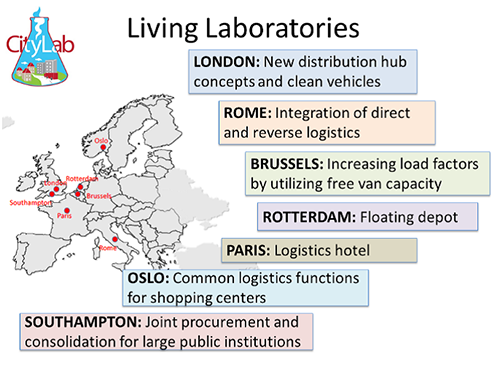United States-European Commission Urban Freight Twinning Initiative: Compendium of Project Summaries
| ||||
| Pilot | Research | Europe |
Funded by the European Commission's Horizon 2020 research program, the CITYLAB project aims to improve basic knowledge and understanding about the impacts of freight distribution and service trips in urban areas. It aims to test and implement seven innovative urban freight management solutions that could positively influence business profitability; reduce traffic and emissions; and have wider potential for roll-out in the logistics sector, and provide a platform for replicating and disseminating the supported solutions. The project focuses on four aspects of urban freight transportation that call for improvement and intervention:
The project supports cities that are working to improve sustainability and livability, as well as private companies that are developing new services and business models for improved sustainability and profitability of their logistics activities. This support is embodied in Living Laboratories (Living Labs), where promising solutions are being tested with the involvement of all stakeholders and from which roll outs over the whole of Europe will be targeted. A group of 18 follower cities has been established. Among those cities, a more limited set of transfer cities will be selected. The transfer cities will receive targeted guidance for transferring specific CITYLAB solutions as well as the Living Lab approach.

CITYLAB Living Laboratories Across Europe.
Source: Dr. Tom Cherrett.
Research and Pilots
May 2015 - April 2018
Brussels, London, Oslo, Paris, Rome, Rotterdam, and Southampton
Jardar Anderson
Project Coordinator
Institute of Transport Economics
+47 997 00 804
JAn@toi.no
Tom Cherrett
Dissemination Manager
University of Southampton
+44 23 80 59 46 57
T.J.Cherrett@soton.ac.uk
The outputs from the Living Labs will include best-practice guidance on innovative approaches and how to replicate them. CITYLAB will lay the groundwork for transfer of cost-effective policies and implementations that lead to increased load factors and reduced movements of freight and service vehicles in urban areas. Increased load factors and reduced vehicle trips will contribute to the European Commission's goal of achieving essentially carbon-free city logistics in major urban centers by 2030.
The project involves local authorities and industry partners in each of the Living Labs. In addition, the Polis network of European cities and regions is assisting with reaching additional cities across Europe. The CITYLAB project uses Living Labs as its approach to fostering the deployment of innovations. The concept of Living Labs, which is new in city logistics, creates an experiential environment in which stakeholders such as citizens, governments, industry, and researchers collaborate to achieve a shared long-term goal. The pursuit of a shared goal is intended to reduce conflicting interests and speed up real-life developments and the deployment of innovations.
|
United States Department of Transportation - Federal Highway Administration |
||